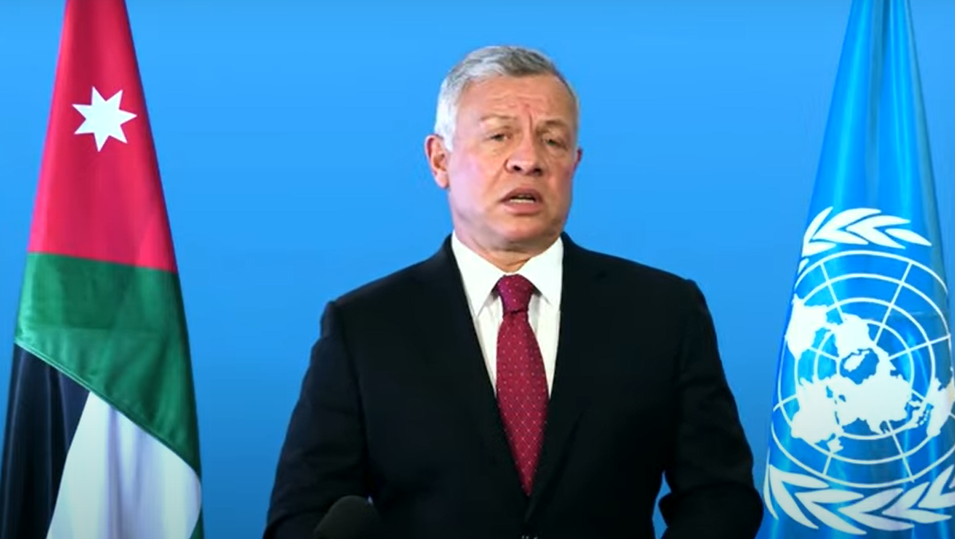Despite assurances from sources in the American administration that the normalization agreement between Israel and Saudi Arabia will preserve the option of a two-state solution, Jordan remains very concerned about the latest developments on this issue.
Its position reflects the sentiments on the Palestinian street, fearing that Saudi Arabia may have “sold” the Palestinian issue for its own interests, similar to what the United Arab Emirates and Bahrain did when they signed the “Abraham Accords” with Israel.
King Abdullah voiced this concern during a gathering organized by the “Al-Monitor” organization in New York on September 23rd. He warned against neglecting the handling of the Palestinian problem within the framework of the normalization agreement between Saudi Arabia and Israel, stating, “Whoever thinks that it will be possible to parachute over the Palestinians is wrong.”
Jordanian sources reveal that King Abdullah has severe criticism for the normalization agreements signed so far between Israel and several Arab countries.
He criticizes them for not resulting in any progress in solving the Palestinian problem.
Shortly after King Abdullah’s remarks in New York, a response came from the United Arab Emirates. Anwar Karkash, adviser to the President of the United Arab Emirates, stated that the Abraham Accords are “successful” and will continue at the strategic level.
However, he clarified that they are not intended to solve the Palestinian problem.
In truth, King Abdullah is more concerned about the fate of the Hashemite Kingdom than the fate of the Palestinians.
While he speaks in favor of the Palestinians, his primary concern is for the Jordanians.
He fears that any delay in solving the Palestinian problem could be at the expense of Jordan, worrying that the Israeli government is plotting to annex the Jordan Valley and push towards the idea that “Jordan is Palestine.”
King Abdullah lays out two principles for solving the Palestinian problem:
- The solution will not be at the expense of the Kingdom of Jordan.
- The Palestinians deserve an independent state along the 1967 borders, with East Jerusalem as its capital and a good and dignified life.
King Abdullah aims to eliminate the possibility of Jordan being an active partner in solving the Palestinian problem since 70 percent of its inhabitants are Palestinians.
He fears the potential of Palestinians trying to take over the Hashemite Kingdom, as they attempted in September 1970, which was later named “Black September.”
The Jordanian king is deeply concerned about the situation within the Palestinian Authority (PA) leadership.
He believes that the leadership is weak, with the 88-year-old Mahmoud Abbas having concluded his political role.
The group around him is facing a severe leadership crisis and is unable to lead to the establishment of an independent Palestinian state.
Senior Fatah officials have recently reached out to the Jordanian royal palace seeking support in the succession battle for the PA leadership. However, King Abdullah rejected all requests.
He believes that Mahmoud Abbas should address the issue and establish a young and new leadership that will succeed him and be acceptable to the Palestinian street.
The approaching normalization between Saudi Arabia and Israel is an unprecedented step in the Middle East that worries both the Palestinians and Jordan.
It symbolizes Israel’s integration into the heart of the Arab and Muslim consensus.
The covert relations between Saudi Arabia and Israel are expected to become public soon.
King Abdullah and PA Chairman Mahmoud Abbas fear that the Palestinian problem will remain unresolved and their hands will be tied.
There are numerous promises and slogans in the air, leaving ambiguity about what the Palestinians will gain from the agreement between Saudi Arabia and Israel.
The Jordanian-Palestinian concern is that the Arab peace initiative of 2002, which originated from the then King of Saudi Arabia, Abdullah bin Abd Alaziz, may gradually disappear after standing for more than 20 years as an immovable cornerstone.




